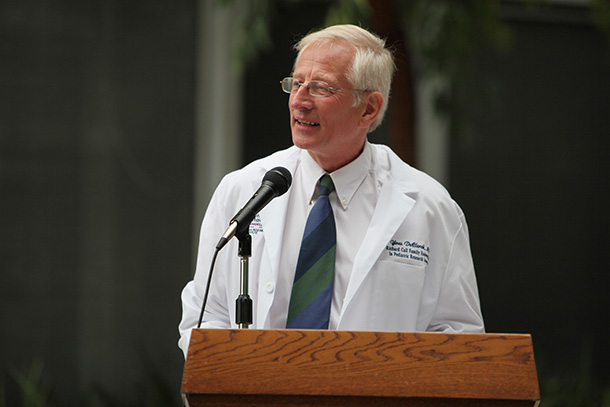Cancer metastasis remains a major treatment challenge and a main cause of morbidity and mortality. A widely accepted explanation for this process is called “the seed and soil” hypothesis, which recognizes the need for the cancer cell, or “seed,” to travel to a hospitable environment, or “soil.”
To understand metastasis, many investigators have focused on the “seed.” Yves DeClerck, MD, professor of pediatrics and biochemistry and molecular medicine at the Keck School of Medicine of USC, has studied this topic for his entire career from a slightly different perspective, concentrating on the “soil.”
In recognition of his leadership in this area, DeClerck recently was awarded $2.2 million from the National Cancer Institute (NCI) to investigate extracellular vesicles called exosomes, small sacs shed by cancerous tumor cells that contain protein, DNA, RNA and lipids, and are taken in by other cells and can modify behavior of the receiving cell.
According to DeClerck, who also is a pediatrician-scientist at Children’s Hospital Los Angeles and director for research education at the Children’s Center for Cancer and Blood Diseases, healthy cells are typically inhospitable to cancer cells. What causes them to change from foe to friend?
Recently DeClerck, along with collaborators at CHLA and the Keck School, published on this topic. The first paper, in the Journal of Extracellular Vesicles, describes research that identified how exosomes induce bone marrow mesenchymal progenitor cells to release factors favorable to cancer cells. A subsequent paper, recently published in Cancer Research, describes the mechanisms by which these bone marrow cells, also present in primary tumors, promote the growth of neuroblastoma cells and their resistance to chemotherapy.
“What if you could intervene early and prevent the cancer cell from modifying the bone marrow, keeping it inhospitable to cancer?” DeClerck asked. “Instead of figuring out how to treat metastatic disease, we could prevent it.”
DeClerck, who also is the co-leader of the Tumor Microenvironment Program at the USC Norris Comprehensive Cancer Center, is collaborating on the NCI study with David Lyden, MD, of Weill Cornell Medical College, who originally proposed the role of tumor-secreted exosomes in cancer metastasis. —Ellin Kavanagh


